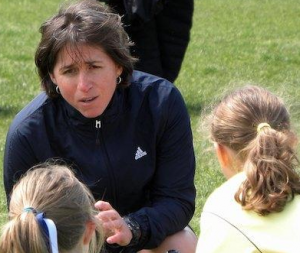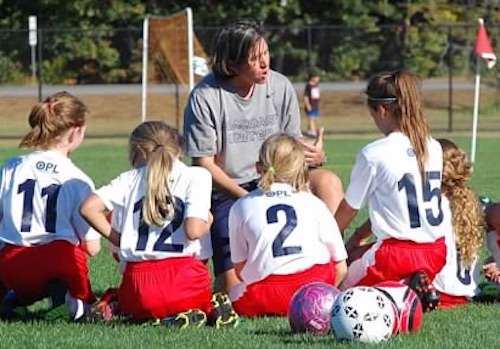Youth Soccer: How Should Players Communicate with Their Coaches?
Dr. Dina Gentile on the proper way for players to approach their coaches – tricks for successful Player-to-Coach Communication. The importance for good communication on and off the field never changes and Gentile’s advice is timeless.
There are times in an athletes’ career when they need a little more guidance or clarification than the words echoed on the practice field by a coach. A season can be filled with three practices a week, many interactions with the coach, but still sometimes players may find that speaking to a coach is not as easy as it should be.

How do we approach a coach as a youth soccer player?
Speaking to any authority figure can be intimidating. The key to communication is to be specific about any concerns and create a plan for what you wish to discuss. Just like we speak to our academic teachers, we must also be able to freely speak to our sport teachers (coaches).
There are a number of reasons why a player needs one on one time with their coach. For one, the player may not have the confidence to ask a question regarding the skills or tactics that were covered in practice. If a player has difficulty understanding what a coach is teaching, they need that extra time with the coach to go over and comprehend the concepts. Coaches want their players to succeed, so when there is a question from a player regarding understanding a practice concept the coach will respond in a positive manner.
Players need to go into the conversation with a specific plan of what they want the coach to answer. So, if a player did not understand a set play or when to move for an offside trap, they need to hone in on a specific question relating to what they did not understand so the coach can assist.
When do we approach a coach?
Equally important to planning your questions, is preparing when to approach your coach. Coaches are typically busy setting up before practices and games. Know when your coach can be most attentive to your needs and undistracted from the rest of the team activities. Often coaches like to address individual concerns away from the rest of the team. Perhaps sending an email to the coach prior to the next practice that you would like to speak to the coach will give the coach a chance to focus more intently on your questions.
Approaching a coach before a game or after a tough loss/victory is not the appropriate time since emotions are running high. Select a time in which you know your coach will be most relaxed and focused.
Asking the questions
When we address a teacher or coach we must always do so in a respectful manner. Coaches make many decisions on positions and playing time. Coaches are in the positions they are in because they are leaders and have the authority to make decisions for the group. Athletes may find issue with playing time and may compare themselves to other players on the team who are playing over them.
Players should always understand that coaches have the final say. Their rotation and usage of players is their decision, and you will not win a coach over if you suggest you should be playing over a teammate. A more effective approach, for example, would be to ask your coach what three areas need to be improved so that you would be able to compete at a higher level. When posing a sensitive question you need to be mindful of the words you use.

Listening to the response
The key to asking a question, is listening to the answer. I have always told my players that if they do not want to hear the truth, they should not ask the question. Coaches will respond if you ask a specific and respectful question. The response may not be what you truly want to hear, but in order to elevate your game as an athlete you must listen to not only the good stuff but also the uncomfortable stuff!
When the coach responds to your inquiry, pay attention to what they said and be respectful by not interrupting their words. Even if you do not like what you are hearing, the best approach is to acknowledge the response and be respectful by thanking the coach for their time. Responding emotionally after a conversation with a coach serves no benefit. Taking time to reflect on the response and turning any negative feelings into positive actions (training more, getting in better shape, listening more to coaching points) will assist in making you a better player and teammate.
Anytime we approach a coach we need to be considerate and positive. Coaches desire players who are positive, want to excel, and can learn from constructive criticism. We need to trust our coaches to provide the player pathway that will be challenging, engaging, and developmentally appropriate for their entire team. Coaches want to teach and develop better players. Players who can listen to the advice and tips of their coaches will become better players.
SoccerToday’s columnist Dr. Dina Gentile is a Professor of Sport Management at Endicott College. A volunteer youth coach herself, Dr. Gentile understands from both practical and theoretical experience what happens on the soccer field. Gentile has also coached the Endicott College Soccer Team for 11 years. Gentile is also the owner/director of Precision Soccer, LLC, which operates camps, clinics, and coach education training throughout the year. She is a former All-American and Academic All-American at Adelphi University. Gentile has been inducted into the Adelphi University and Endicott College Halls of Fame. In addition, she is a trainer with Positive Coaching Alliance and the Girls Program Director with New England Premiership Club – Benfica USA. She is the proud coach of her daughter’s and son’s soccer teams in her hometown.





